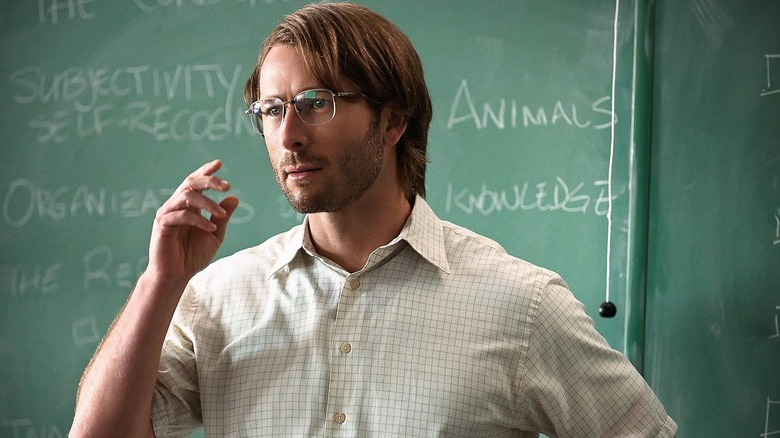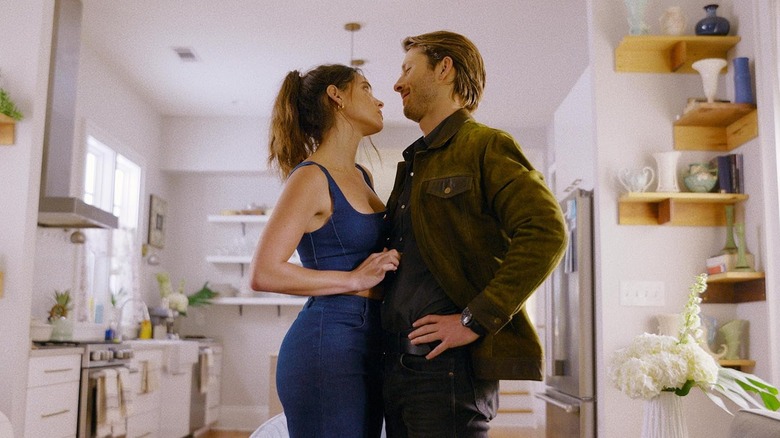Why A Lot Of Studios Rejected Glen Powell's Hit Man
Netflix and Richard Linklater certainly make for peculiar bedfellows. Where every other Netflix exclusive feels like it was concocted by an algorithm and designed to have maximum appeal, Linklater has been perfectly happy to direct films for a niche market these past 30-plus years. Even at his most commercial, with a film like "School of Rock," you get the sense the eccentric Texan auteur is making movies that speaks to his interests first and foremost.
Yet, somehow, Linklater has now found himself releasing back-to-back films for the streaming giant. The first of them, 2022's "Apollo 10 1⁄2: A Space Age Childhood" — a rotoscope-style animated feature where segments inspired by the filmmaker's real childhood in 1960s Houston are seamlessly integrated with a fictional story about a young boy being recruited by NASA for an off-the-books space mission — reads like the opposite of what studios feel constitutes an easy sell. It plays that way, too, allowing its plot to amble along with the same leisurely pacing as one of Linklater's homegrown hangout joints, despite being, in theory anyway, much more story-driven.
His follow-up, "Hit Man," is a similar potpourri of ideas and elements. Loosely inspired by real events, the film reunites Linklater with his "Fast Food Nation" and "Everybody Wants Some!!" actor Glen Powell, who plays a philosophy professor whose side-gig working for the police leads to him masquerading as a hitman and falling for an abuse victim (Adria Arjona) hoping to employ his services. Ah, yes, that old chestnut and definitely one of the "14 scripts" in Hollywood that Cameron Diaz once famously referred to. No doubt, you'll be shocked to hear that Linklater told the BBC that studios "really didn't want to make the film" when he and Powell (who also co-wrote "Hit Man") were searching for a backer.
Hit Man's originality was a turn-off for studios
An original story? Check. Adult subject matter? Check. An absence of franchise potential? Check. We can quibble about the quality of "Hit Man" (I happen to agree with this sentiment from Chris Evangelista's review for /Film: "It's fun, it's charming, it's a little too slight for its own good"), but there's nothing about the movie that suggests it was manufactured in a lab at the behest of studio executives. "Glen and I wrote it speculatively and we didn't get paid anything, we just tried to get the film made," Linklater confirmed, adding:
"We really felt we were onto something, we felt we had written a film noir, a crime film that's also a screwball comedy about a couple that you're rooting to be together, but I think they [the studios] wanted it to be just one thing."
Linklater added that he and Powell had "frustrating conversations" with "studios and people like that" who basically wanted the film to be an action rom-com about an actual hitman like "Grosse Pointe Blank" — "something they'd seen before," as Linklater put it, and would therefore be seen as a safer bet. As he observed:
"You don't get fired for doing a sequel or an origin story, something that already exists. You don't get in trouble for what's obvious and commercial. What changed is that films got greenlit by the marketing department and then it's become really safe choices."
The double-edged nature of Netflix means that "Hit Man" is under less pressure to appeal to a sizable crowd, but it's also way less likely to become a breakout success like Powell's rom-com hit "Anyone But You." But maybe that's how Linklater prefers it; so long as he can stay in his lane and chart his own course, he doesn't seem worried about others roaring by him on the highway (nor does he need to be).
"Hit Man" is now streaming on Netflix.

